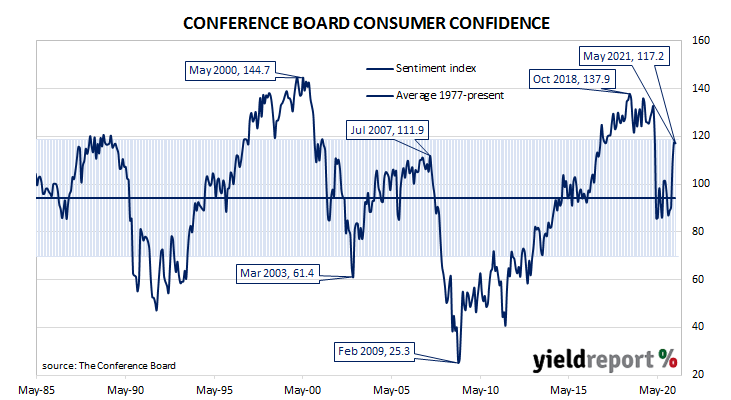Summary: US consumer confidence essentially steady in May; marginal decline in Conference Board index reading less than expected; view of present conditions rises, short-term outlook falls; consumers “remain optimistic”; “economic growth remains robust” but “decelerating growth, softening labour market” expected; peak consumer confidence reached but “plenty of pent-up demand.”
After the GFC in 2008/09, US consumer confidence clawed its way back to neutral over a number of years and then went from strength to strength until late 2018. Measures of consumer confidence then oscillated within a fairly narrow band at historically high levels until they plunged in early 2020. Subsequent readings then fluctuated around the long-term average until March this year.
The latest Conference Board survey held during the first half of May indicated US consumer confidence essentially held steady after four consecutive months of rises. May’s Consumer Confidence Index registered 117.2, under the median consensus figure of 120.0 and just below April’s final figure of 117.5.
Consumers’ views of present conditions improved while their outlook of the near-future deteriorated. The Present Situation Index rose from 131.9 to 144.3 while the Expectations Index fell from 107.9 to 99.1.
“Overall, consumers remain optimistic, and confidence should remain resilient in the short term, as vaccination rates climb, COVID-19 cases decline further and the economy fully reopens,” said Lynn Franco, a senior director at The Conference Board.

Long-term US Treasury bond yields moved lower on the day. By the close of business, the 10-year Treasury bond yield had lost 4bps to 1.56% and the 30-year had shed 5bps to 2.25%. The 2-year yield remained unchanged at 0.15%.
In terms of US Fed policy, expectations of any change in the federal funds rate over the next 12 months remained low. Federal funds futures contracts for May 2022 implied an effective federal funds rate of 0.09%, about 3bps above the current spot rate.
Franco said the improvement in the Present Conditions index suggests “economic growth remains robust” in the June quarter but the fall in the Expectations Index reflected “expectations of decelerating growth and softening labour market conditions in the months ahead.” She also noted respondents’ views of their prospects “were also less upbeat this…a reflection, perhaps, of both rising inflation expectations and a waning of further government support…”

